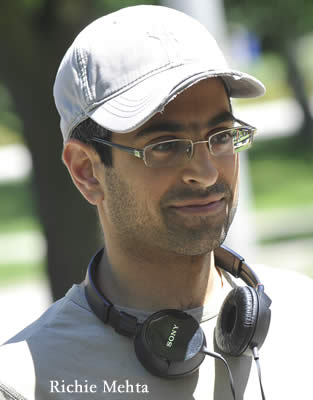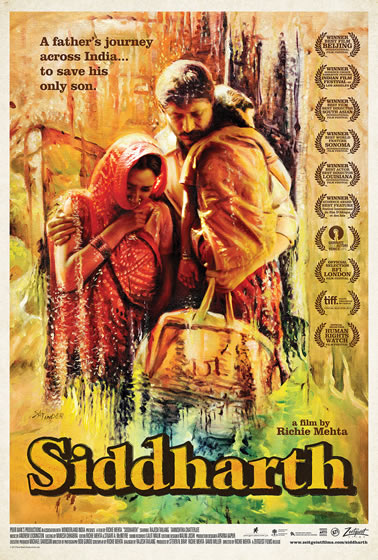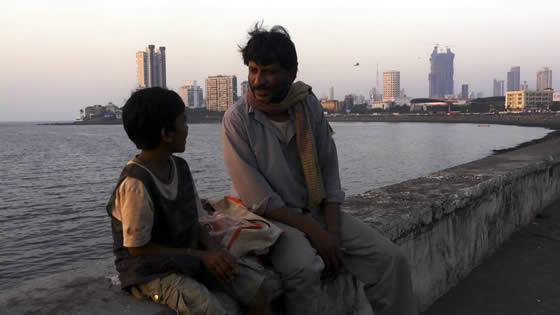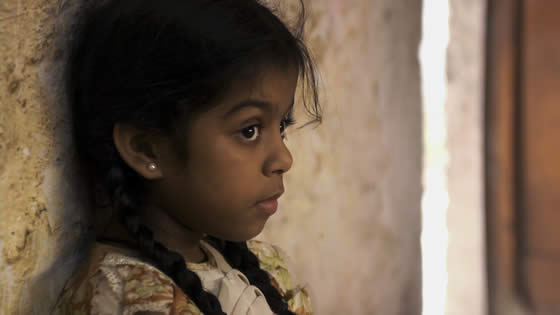 Siddharth is the spellbinding and gorgeously wrought tale of one fatherʼs journey across India in search of his son. Mehendra is a chain-wallah, eking out a living fixing zippers on the bustling streets of New Delhi. To ease his financial woes, he sends twelve-year-old Siddharth to work in a distant factory. When the boy doesnʼt come home for the Diwali holiday, Mehendra and his wife Suman slowly begin to suspect that he was kidnapped by child traffickers. With few resources and no connections, Mehendra desperately travels to Punjab and Mumbai with the hope that whoever took Siddharth might return him unharmed. A powerful family drama both heart-rending and suspenseful, Siddharth won Best Film (and Best Director for Richie Mehta) at the South Asian International Film Festival and is an Official Selection of Human Rights Watch.
Siddharth is the spellbinding and gorgeously wrought tale of one fatherʼs journey across India in search of his son. Mehendra is a chain-wallah, eking out a living fixing zippers on the bustling streets of New Delhi. To ease his financial woes, he sends twelve-year-old Siddharth to work in a distant factory. When the boy doesnʼt come home for the Diwali holiday, Mehendra and his wife Suman slowly begin to suspect that he was kidnapped by child traffickers. With few resources and no connections, Mehendra desperately travels to Punjab and Mumbai with the hope that whoever took Siddharth might return him unharmed. A powerful family drama both heart-rending and suspenseful, Siddharth won Best Film (and Best Director for Richie Mehta) at the South Asian International Film Festival and is an Official Selection of Human Rights Watch.
Richie Mehtaʼs first feature, Amal, has won over 30 international awards, was nominated for six Genie (Canadian Oscar) Awards, including Best Picture, Director and Adapted Screenplay. Amal was also named one of the top ten Canadian films of the decade by Playback Magazine. Mehta recently completed the sci-fi feature Iʼll Follow You Down, starring Haley Joel Osment, Gillian Anderson, Rufus Sewell, and Victor Garber, for Resolute Films and eOne, to be released later this year
Bijan Tehrani: What inspired you to make SIDDHARTH?
Richie Mehta: It’s inspired by the true story of a rickshaw-wallah I met, who lost his son. I was in a rickshaw and he told me this whole thing – how he sent his 12-year-old son to a factory job in a different city, and never saw him again. He then found out he may have been kidnapped, and taken to a placed called “Dongri.” He asked me for help trying to find where “Dongri” was – nobody seemed to know. He had been asking people for a year – anyone he met – if they could help him on this point. He also didn’t have a photograph of his son, nor did he know how to write his son’s name. I did a google search and found “Dongri” in 5 seconds. So many aspects of this situation were unfathomable. I couldn’t help him since it had been too long, his boy was long gone. This was the next best thing I could do.
if they could help him on this point. He also didn’t have a photograph of his son, nor did he know how to write his son’s name. I did a google search and found “Dongri” in 5 seconds. So many aspects of this situation were unfathomable. I couldn’t help him since it had been too long, his boy was long gone. This was the next best thing I could do.
BT: SIDDHARTH is closer than any films that I have seen in recent years to the works of great Indian directors such as Satyajit Ray. How challenging was to make an honest film like this?
RM: That’s a very kind statement to make, thank you. It’s hard to really answer this question, because I feel that making this film as honest as possible was the reason to make it in the first place. So I can’t really say there is even a different version of the film. I wanted to make a film that showed a specific world, a strata of society in India – the place of my birth – and I wanted to do it in way that showed how people can make mistakes, slip through the economic cracks we’ve created, and still not judge them in any way for making those mistakes. So the challenges in making this film as an honest film was making the film period, if that makes sense.
BT: One important aspect of SIDDHARTH is that you never try to bring false hope and happy ending to the film and you leave the audience with realities of life, how did you make that choice? How such choices effects the box office of your film?
RM: The ending was always set in my mind, but I didn’t want to show the harsh realities in a harsh way. In fact, I wanted to show a realistic resolution to this circumstance, while still maintaining some sense of optimism. That the characters we’ve just spent 96 minutes with will be okay, somehow. And that we just spent that time with intelligent, compassionate people, rather than watched the terrors that I’ve implied in the film. I think it’s easy to show how nasty we can be to each other. What’s more difficult is to sit in that nastiness, and find some sort of light, in a realistic context. In terms of box office – I’ll let you know when I have the numbers!
 BT: I believe among films made by new wave of filmmakers around the world, SIDDHARTH is a film that deals with an important issue with honesty and bravery, did you do any research on the subject and how did you work on the screenplay of SIDDHARTH?
BT: I believe among films made by new wave of filmmakers around the world, SIDDHARTH is a film that deals with an important issue with honesty and bravery, did you do any research on the subject and how did you work on the screenplay of SIDDHARTH?
RM: I did a lot of research, yes. After hearing the initial story I mentioned above, I embarked on the search that this character would have to go through. That meant going through the motions, the same places he might end up, conversing with the people he would meet. The thing is, I got much further than someone like Mahendra would get, because of my education and access. If I speak to social workers in NGOs, they’re more willing to reveal information to me than they would some guy on the street, which is how they would see Mahendra. So I had to then interpolate – where would his search hit a brick wall, and how would key information be revealed to him. That was a combination of logic and intuition, and I think we’ve got it pretty close to the mark throughout. Obviously, a great deal of what happens depends on how Mahendra acts, and that’s based on who he is as a person. That was very much Rajesh Tailang (who played Mahendra, and translated the film into Hindi from my Engligh-language script) and I constructing his character. Rajesh was instrumental in added details and attitude to the characters. Tannishtha Chatterjee as well, she really brought Suman to life.
BT: How did you go about casting of your film? You have amazing performances in SIDDHARTH, how did you work with your actors?
RM: Thank you. The two leads, Rajesh and Tannishtha, are dear friends of mine. In fact, I was on my way to meet Rajesh when I was in this rickshaw, and heard the story. He was the first person I told the story to, and Tannishtha the second. They were intimately involved from the start.
The rest of the actors came from my casting director, Mukesh Chhaba, who also plays “Mukesh-Bhai,” the railway station gangster in the film. He’s a Mumbai casting director, and a very dear friend as well. One of his many talents is finding actors who know the people and the world they portray. So Geeta Agarwal Sharma, who plays the police officer “Roshni,” knows that type of officer. N.K. Pant, who plays “Pundit-Ji,” the food stand owner, knows that type of food-stand owner. And so on. And Aakash Dhayia was our casting associate, who found and trained all of our children. Aakash and Mukesh are the reason the acting in this film feels so real.

BT: Please tell us about the visual style of SIDDHARTH, have you been interested in Italian New Realist cinema?
RM: A few films inspired the planning of the film’s style and tone. Jafar Panahi’s “Crimson Gold,” and Michael Winterbottom’s “In this World.” Both films felt so real that I question – to this day – if those were real people, or actors. And I question whether they really endured some of those moments on film. Italian neo-realism was always on my mind as well, but in a modern context, such as these two examples above.
But when you start shooting, the film takes on a life and style of it’s own, dictated by constraints and the aesthetics of the environment, the pacing of the performances, and how much coverage one gets. I edited in my head as I went, but verisimilitude was the call of the day.
BT: Please tell us about your future projects.
RM: I have a science-fiction drama called “I’ll Follow You Down,” starring Gillian Anderson, Haley Joel Osment, and Rufus Sewell, that is actually on iTunes in the U.S. as we speak, and just released in Canada theatrically. I’m also in the middle of writing three original scripts. Two take place in India, one in China. Eclectic bunch! All of them continue the line of thinking I pursued in SIDDHARTH.

